'...spent 1/10th of his time at 24, Akbar Road...'
'He would have met thousands of party workers and ordinary Congress supporters who have love for the party.'
'Left of Centre intellectuals have shaped Rahul's values, but he lacks earthiness.'
Rasheed Kidwai, author of the best-selling 24 Akbar Road, recalls interesting stories that defined its time.

24, Akbar Road was not built as a party office. The colonial bungalow was meant to be a temporary office in 1978, but remained the Congress HQ for 47 years.
It had limited rooms, washrooms etc and did not have a ladies toilet till about 2012. The women general secretaries had attached toilet in their offices, but women visitors and workers had to use a makeshift toilet.
It was not designed as an office. There was no biometric, or attendance register. Since there is no salary culture in political parties, the general secretaries would get reimbursed for petrol against vouchers.
The main room in the bungalow was occupied by the Congress president. The other rooms assigned to the general secretaries.
P V Narasimha Rao hardly used the room as Congress president, but the party benefited most from him. Since he was PM, the SPG had to be accommodated for his token visits. Makeshift rooms were constructed for the SPG which were later used by the general secretaries.
The AICC office at 24, Akbar Road was quite chaotic and disorganised. There was no or very little use of technology. Even though they had computers, mobiles, they were not used much which resulted in a lot of paperwork.
There were long time hangers on at the office which was sort of a parallel Congress Working Committee. They were the real movers and shakers. The power brokers who knew about appointments, the movement of files from different offices. They organised jobs like logistics and printing of election material which involved a fair amount of money, and had a lot of information of the going ons.
There used to be a board outside a temporary fabricated room in the main building which was the Central Election Authority.
It was a small room which could barely accommodate seven, eight people with a rather imposing name. I used to joke and say that the committee responsible for conducting the elections of the Congress party whose membership ran into two odd crore functioned out of a makeshift room which could not even accommodate eight chairs and that's how it went on for years and years.
It might amuse or upset people to know that the great Indian National Congress that is 140 years old does not have a library.

There are hundreds of karamcharis who are part of AICC staff attached to the general secretaries and other office bearers.
Many live at 24, Akbar Road. They are the faceless people who have seen many general secretaries, Congress presidents, vice presidents and office bearers come and go over the years.
I remember Digvijay Singh gave 150 dinner sets to every employee when he became chief minister of Madhya Pradesh for the second time in 1998.
Many of the staff's daughters or sons would get married at 24, Akbar Road. Sonia Gandhi, who has a huge collection of saris, would gift them saris. She would receive saris as gifts from all over the country and would distribute many of the saris to the staff.
Catering at Congress Working Committee meetings was done by Nathu Sweets, Bengali Sweet House from Bengali Market and from Kaleva Sweets.
There was also an element of tragedy to 24, Akbar Road because the Congress PMs did not spend enough time there.
When the Congress moved here in 1978, Indira Gandhi was out of power, but when she became prime minister, she did not get much time to come here.
Rajiv Gandhi spent time here as general secretary, but then became prime minister. Narasimha Rao did not go to office and functioned from home.
Since Sonia Gandhi was the longest serving Congress president, she spent a lot of time at that office.
Ahmad Patel, who wore many hats -- political secretary to Sonia Gandhi, AICC general secretary, treasurer etc -- did not spend much time there because he was unsure of the confidentiality. He felt there were a lot of hangers on who would come in and out.
Rahul and Priyanka also did not spend too much time there. They were young when Indira Gandhi was PM and did not visit much.
After Rajiv Gandhi's assassination they had a lot of security restriction on movement. Then Rahul went abroad to study and I think had little emotional attachment with that office.
If like his father, he had spent some time there, it would have helped him. He would have met thousands of party workers and ordinary Congress supporters who have love and affection for the party.
Left of Centre and semi or quasi academic intellectuals have shaped his values, but he lacks earthiness.
If he had met and spent 1/10th of his time at 24, Akbar Road, he would have been wiser, because here people came with a sense of association for the Congress.
I remember Indira Gandhi would meet one and all. No one returned empty handed.

Technocrats have a very transactional way of looking at politics which is devoid of emotions, and therefore, very cut and dry.
Another change that has happened is that the entire political class has moved from a morning to a night routine.
Earlier, many politicians, particularly Congress politicians, would meet any number of people who came from outside Delhi.
This evaporated over the years because politicians started meeting at night. This meant that the wealthy with cars had access and ordinary people who used public transport were cut off.
This transition from day to night brought a sort of corporate culture which left out ordinary folks.

Another incident I remember clearly that took place at 24, Akbar Road was on May 14, 1999. All of India was in a hurry to see the India-England match when Sharad Pawar and P A Sangma etc revolted against Sonia Gandhi on her foreign origin.
Sonia stormed out of the meeting and Arjun Singh ran behind her forgetting his slippers. It was an iconic picture of her looking back sternly and Arjun Singh folding his hands as if he was apologising on behalf of the whole Congress party.
The walls of every room at 24, Akbar Road have a lot of history and the Congress should try and preserve it as a museum and hold onto it.
It has seen history not only about the Congress, the Gandhis, but the nation.
Feature Presentation: Aslam Hunani/Rediff.com
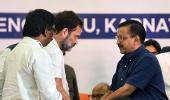
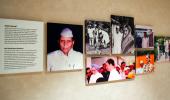
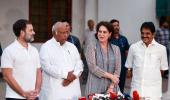





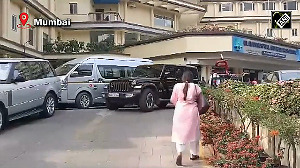
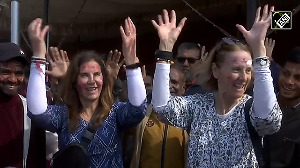

 © 2025
© 2025